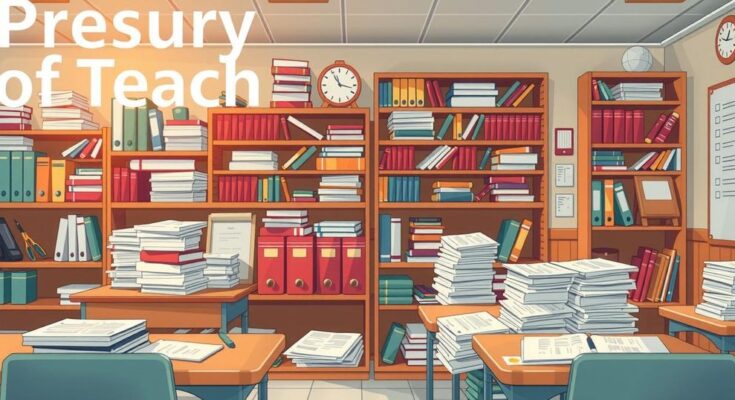In a recent study led by researchers from the University of Göttingen, a concerning sentiment among Berlin educators has surfaced, revealing feelings of overwhelm and dissatisfaction within the profession. Conducted through an online survey of 2,385 teachers, the results shared by the Berlin branch of the Education and Science Workers’ Union (GEW) reflect a significant disconnect between teachers and their job satisfaction.
The survey illuminated a disheartening perspective among educators; nearly half (46%) indicated they would not choose to be teachers again. Adding to this uncertainty, 41% of respondents were ambivalent, while only 13% affirmed a willingness to embark on this career path once more. Such statistics point to a critical evaluation of the teaching vocation, particularly amid rising workloads.
Moreover, a vast majority of teachers expressed reluctance to recommend the profession. Only 20% would advocate for a teaching career, whereas 35% outright would not, with 45% uncertain. This stark contrast becomes more profound when considering that 69% of workers across various sectors nationally would champion their jobs.
Frank Mußmann, from the University of Göttingen, underscored the dissatisfaction stemming from working conditions in Berlin schools, linking it directly to the persistent shortage of teaching staff. Many teachers voiced concerns over excessive workloads, compounded by time pressures that often require weekend work, which blurs the boundaries of work-life balance, as highlighted by GEW Berlin’s chairperson, Martina Regulin.
The burden of a widening range of responsibilities weighs heavily on teachers in a city where around one-third of students face poverty. Lydia Puschnerus, a teacher and GEW official, painted a vivid portrayal of their roles—balancing duties akin to that of psychologists or social workers, showcasing the emotional toll educators endure.
The education administration has faced criticism for reducing support systems like external collaborations and social work, services deemed crucial by teachers for alleviating their workload. Puschnerus noted that while beneficial, these services should not overshadow the necessity of teaching staff.
Despite the glaring issues, 80% of surveyed educators expressed a desire to stay at their current schools. However, Ralf Schäfer, a GEW member, lamented that many remain stagnant in their positions, doubting that better circumstances exist elsewhere, stressing the need for immediate administrative intervention.
The GEW advocates for enhanced staffing measures, including the integration of social workers and support staff to ease teachers’ burdens. These proposals are aimed at improving working conditions and reinforcing the vital roles educators play amidst mounting challenges.
A study by the University of Göttingen reveals that nearly 46% of Berlin teachers would not choose to be teachers again, with significant workload challenges causing dissatisfaction. Only 20% would recommend the profession, contrasting sharply with national averages. The GEW calls for improved staffing and resource allocation to alleviate burdens, underscoring the urgent need for administrative reform in teaching conditions.
The current sentiment among Berlin educators underscores a pressing need for reform within the teaching profession. With nearly half of teachers expressing dissatisfaction and reluctance to recommend their careers, the education system faces a critical juncture. Addressing workload issues and ensuring adequate support are essential steps towards enhancing job satisfaction and retaining teaching staff. The advocacy for increased resources and staffing highlights the necessity of supporting educators in their roles to foster a healthier educational environment.
Original Source: themunicheye.com



